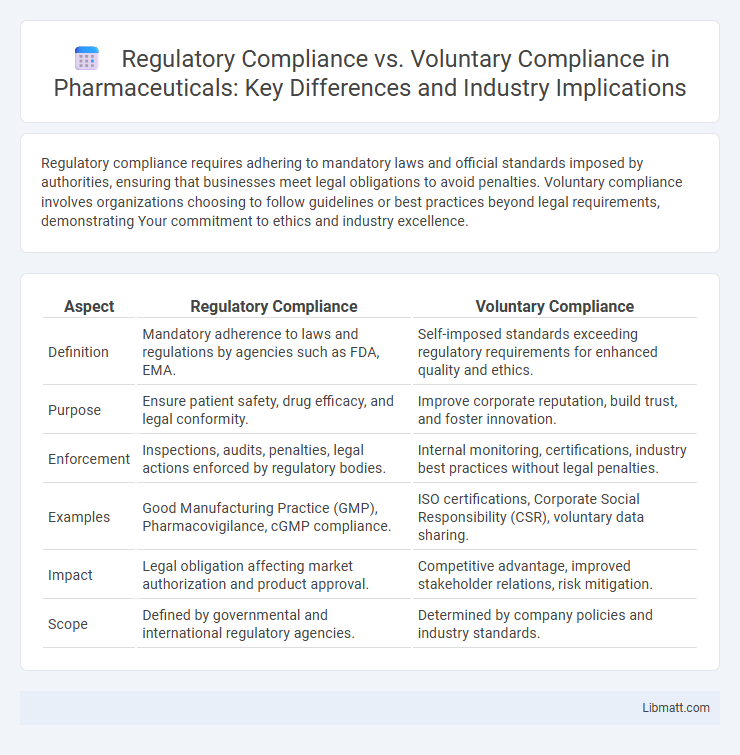Regulatory compliance requires adhering to mandatory laws and official standards imposed by authorities, ensuring that businesses meet legal obligations to avoid penalties. Voluntary compliance involves organizations choosing to follow guidelines or best practices beyond legal requirements, demonstrating Your commitment to ethics and industry excellence.
Table of Comparison
| Aspect | Regulatory Compliance | Voluntary Compliance |
|---|---|---|
| Definition | Mandatory adherence to laws and regulations by agencies such as FDA, EMA. | Self-imposed standards exceeding regulatory requirements for enhanced quality and ethics. |
| Purpose | Ensure patient safety, drug efficacy, and legal conformity. | Improve corporate reputation, build trust, and foster innovation. |
| Enforcement | Inspections, audits, penalties, legal actions enforced by regulatory bodies. | Internal monitoring, certifications, industry best practices without legal penalties. |
| Examples | Good Manufacturing Practice (GMP), Pharmacovigilance, cGMP compliance. | ISO certifications, Corporate Social Responsibility (CSR), voluntary data sharing. |
| Impact | Legal obligation affecting market authorization and product approval. | Competitive advantage, improved stakeholder relations, risk mitigation. |
| Scope | Defined by governmental and international regulatory agencies. | Determined by company policies and industry standards. |
Introduction to Regulatory and Voluntary Compliance
Regulatory compliance involves adhering to laws, regulations, and standards mandated by government agencies, ensuring Your organization meets legally binding requirements to avoid penalties. Voluntary compliance refers to the proactive adoption of industry best practices or ethical guidelines beyond legal obligations, enhancing reputation and operational efficiency. Understanding the distinction helps businesses strategically balance risk management with value-driven initiatives.
Defining Regulatory Compliance
Regulatory compliance refers to the mandatory adherence to specific laws, regulations, and standards imposed by governmental bodies to ensure legal and ethical business operations. Organizations must implement structured policies and controls to meet regulatory requirements such as data privacy laws (e.g., GDPR), financial reporting standards (e.g., SOX), and environmental regulations. Failure to comply with these mandatory regulations can result in legal penalties, fines, and reputational damage.
Understanding Voluntary Compliance
Voluntary compliance refers to the self-imposed adherence to laws, standards, or guidelines without external enforcement, emphasizing proactive responsibility in maintaining ethical conduct and operational integrity. Your commitment to voluntary compliance enhances organizational reputation and reduces the risk of regulatory penalties by fostering a culture of transparency and accountability. This approach often involves exceeding minimum legal requirements to achieve best practices and long-term sustainability.
Key Differences between Regulatory and Voluntary Compliance
Regulatory compliance involves adhering to laws and government-mandated rules, ensuring your organization meets legally binding standards to avoid penalties. Voluntary compliance, on the other hand, exceeds legal requirements by following industry best practices or ethical guidelines, enhancing reputation and operational efficiency. Understanding these key differences helps you strategically balance mandatory obligations with proactive measures for sustainable business growth.
Benefits of Regulatory Compliance
Regulatory compliance ensures businesses meet mandatory legal standards, reducing the risk of fines and legal penalties while enhancing corporate reputation. Compliance with regulations fosters trust among stakeholders, including customers, investors, and regulatory bodies, promoting long-term sustainability. Adhering to regulatory requirements also helps organizations avoid operational disruptions and supports market competitiveness by establishing a foundation of accountability and safety.
Advantages of Voluntary Compliance
Voluntary compliance allows organizations to proactively adopt best practices, often leading to improved operational efficiency and reduced risk of legal penalties. Your commitment to voluntary standards can enhance brand reputation and build trust with customers and stakeholders. This approach also provides flexibility to tailor compliance efforts to specific business needs, fostering innovation without the constraints of rigid regulations.
Challenges in Achieving Regulatory Compliance
Achieving regulatory compliance involves navigating complex legal frameworks, which often require significant resource allocation for monitoring and documenting adherence to ever-evolving standards. Organizations face challenges such as interpreting ambiguous regulations, managing compliance costs, and ensuring employee training aligns with specific requirements. In contrast, voluntary compliance allows for more flexibility but may lack the enforcement mechanisms that drive consistent adherence in regulatory contexts.
Limitations of Voluntary Compliance
Voluntary compliance often lacks enforceability, making adherence inconsistent and dependent on the goodwill of organizations or individuals. This approach can result in gaps where critical regulatory objectives are unmet, potentially exposing stakeholders to risks and liabilities. Without legal consequences, businesses may prioritize cost savings over compliance, undermining the effectiveness of voluntary measures in areas such as environmental protection and financial reporting.
Impact on Organizational Reputation and Performance
Regulatory compliance ensures organizations meet legal standards, minimizing risks of fines and sanctions, which directly protects and enhances their reputation. Voluntary compliance, often exceeding mandatory requirements, demonstrates corporate social responsibility and can boost stakeholder trust, leading to improved performance and competitive advantage. Both compliance types influence organizational reputation, but voluntary efforts often yield greater long-term benefits by fostering innovation and stronger stakeholder relationships.
Choosing the Right Compliance Strategy
Choosing the right compliance strategy depends on your organization's risk tolerance, industry requirements, and long-term goals. Regulatory compliance mandates adherence to laws enforced by government agencies, ensuring legal protection and avoiding penalties. Voluntary compliance, driven by internal policies or industry standards, enhances reputation and operational efficiency but requires commitment beyond legal obligations.
Regulatory compliance vs Voluntary compliance Infographic

 libmatt.com
libmatt.com